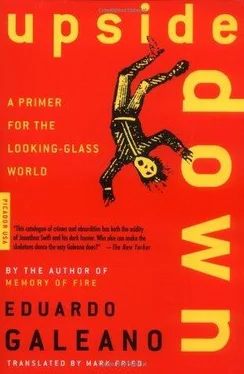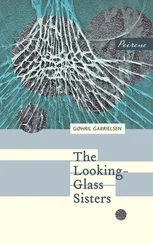The publication of that document caused quite a furor: such things are to be done but not said. Summers imprudently set to paper what the world has been doing in practice for a long time. The South functions as the garbage can of the North. The factories that most pollute the environment migrate south, and the South is the dump where most of the industrial and nuclear shit the North generates ends up.
Sixteen centuries ago, Saint Ambrose, priest and doctor of the Church, prohibited usury among Christians and authorized it against barbarians. The same thing happens nowadays with the most lethal pollution. What’s bad in the North is good in the South; what’s outlawed in the North is welcome in the South. In the South lies the vast kingdom of impunity; there are no controls or legal limits and, when there are, it’s never hard to discover their price. The complicity of local governments rarely comes free, and then there’s the cost of waging advertising campaigns against the defenders of nature and human dignity, dismissing them as advocates of backwardness who only want to scare off foreign investment and sabotage economic development.
At the end of 1984, in the city of Bhopal, India, forty tons of deadly gas leaked from a pesticide factory run by the chemical company Union Carbide. The gas spread through the shantytowns, killing 6,600 people and harming another 70,000, many of whom died shortly thereafter or were maimed for life. Union Carbide in India did not abide by any of the security regulations it must adhere to in the United States.
In Latin America, Union Carbide and Dow Chemical, like the other giants of the world’s chemical industry, sell many products that are outlawed in their own country. In Guatemala, for example, crop dusters spray the cotton plantations with pesticides that can’t be sold in the United States or Europe. These poisons filter through the food chain into everything from honey to fish and finally reach the mouths of babes. As early as 1974, a study by the Central American Nutrition Institute found that the milk of many Guatemalan mothers contained up to two hundred times the pesticide limit considered dangerous.
Bayer, the world’s second-largest producer of pesticides, has been untouchable since the days when it was part of the I. G. Farben consortium and used unpaid labor from Auschwitz. At the beginning of 1994, a Uruguayan environmental activist became a Bayer stockholder for a day. Thanks to the solidarity of German friends, Jorge Barreiro was able to raise his voice at an annual stockholders meeting graced with beer, sausage, mustard, and aspirins. Barreiro asked why the company sold toxic agricultural chemicals in Uruguay that were banned in Germany, three of which the World Health Organization considered “extremely dangerous” and another five “highly dangerous.” The usual transpired. Every time someone raises the issue of selling in the South poisons prohibited in the North, the executives of Bayer and the other global chemical companies have the same answer: they aren’t breaking any laws in the countries where they operate, which could be technically true, and besides, their products are not dangerous. They never explain the enigma of why these balms of nature can’t be enjoyed by their own countrymen.
Maps
In the United States, the environmental map is also a racial map. The most polluting factories and the most dangerous dumps are located in the pockets of poverty where blacks, Indians, and Latinos live.
The black community of Kennedy Heights in Houston, Texas, exists on land ruined by Gulf Oil’s wastes. The residents of Convent, the Louisiana town where four of the dirtiest factories in the country operate, are nearly all black. Most of those who went to the emergency room in 1993, after General Chemical rained acid on the northern part of Richmond on San Francisco Bay, were black. A 1987 study by the United Church of Christ confirmed that the majority of the population living near hazardous waste dumps was black or Latino.
Indian reservations take in nuclear waste in exchange for money and the promise of jobs.
Maximum production, minimum cost, open markets, high profits — the rest is unimportant. Many U.S. industries had already set up shop on the Mexican side of the border long before the two countries signed a free-trade agreement. They turned the border zone into a vast industrial pigpen. All the treaty did was make it easier to take advantage of Mexico’s abysmal wages and the freedom to poison its water, land, and air. To put it in the language of the poets of capitalist realism, the treaty maximized opportunities to make use of the resources of comparative advantage. Four years before the treaty, the waters near the Ford plant in Nuevo Laredo and the General Motors plant in Matamoros already contained thousands of times more toxins than the maximum allowed on the other side of the border. And in the vicinity of the Du Pont plant, also in Matamoros, the filth was such that people had to be evacuated.
Progress spreads across the globe. Japanese aluminum is made no longer in Japan but in Australia, Russia, and Brazil, where energy and labor are cheap and the environment suffers in silence. To provide electricity for the aluminum industry, Brazil has flooded gigantic tracts of tropical forest. No statistic can register the ecological cost of that sacrifice. After all, it’s normal: Amazonian flora and fauna have suffered many sacrifices, mutilated day after day, year after year, in the service of lumber, cattle, and mining companies. Such organized devastation makes “the lungs of the earth” ever more vulnerable. The gigantic fire in 1998 that razed the forests of the Yanomami Indians in Roraima was not just the devilish work of El Niño.
Development
A bridge with no river.
A tall façade with no building.
A sprinkler on a plastic lawn.
An escalator to nowhere.
A highway to the places the highway destroyed.
An image on TV of a TV showing another TV on which there is yet another TV.
Impunity is fed by fatality, and fatality obliges us to accept whatever orders are dictated by the international division of labor — like the fellow who jumped from the tenth floor to obey the law of gravity.
Colombia grows tulips for Holland and roses for Germany. Dutch companies send tulip bulbs and German companies send rose seedlings to immense plantations on the savannah of Bogotá. When the flowers are ready, Holland gets the tulips, Germany gets the roses, and Colombia gets low wages, damaged land, and poisoned water. Thanks to these floral arrangements of the industrial era, the savannah is drying out and sinking, while the workers, nearly all of them women and children, are bombarded by pesticides and chemical fertilizers.
The rich countries grouped in the Organization for Economic Cooperation and Development cooperate in economically developing the South by sending it radioactive garbage and other toxic expressions of kindness. The very countries that outlaw the importation of polluting substances shower them generously on poor countries. Just as with pesticides and herbicides banned at home, they export hazardous waste to the South under other names. The Basil Convention banned such shipments in 1992, yet there are more today than ever before. They come disguised as “humanitarian aid” or “contributions to development projects,” as Greenpeace discovered on several occasions, or they come as contraband hidden inside mountains of legal industrial waste. Argentine law bans the entry of hazardous waste, but to solve that little problem all you need is a certificate of innocuousness issued in the country that wants to get rid of the waste. At the end of 1996, Brazilian ecologists managed to put an end to the importation of used car batteries from the United States that for years had come into the country as “recyclable material.” The United States exported used batteries and Brazil paid to receive them.
Читать дальше











